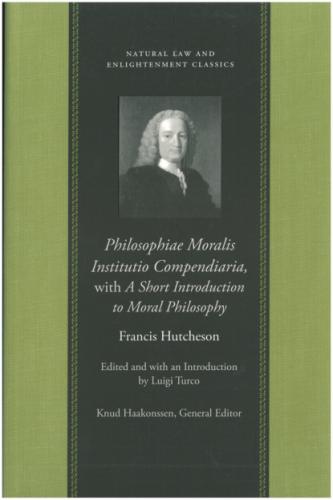2. Signorum duplex usus, eorumque leges. [The two uses of speech, and their laws.] 201.
3. De sermonis usu cautiones. [Cautions in the use of speach.] 203–206.
4. Officia in sermone honestiora. [The more honourable duties in speach.] 206.
Cap. XI. De jurejurando et votis. [On oaths and vows.] 208.
1. Jurisjurandi definitio et usus. [The nature of oaths and their use.] ib. <viii>
2. Quis invocandus et qua formula? [Who ought to be invoked and in which form.] 209. Jus jurandum non mutat officium. [Oath does not alter a duty.] 211.
3. Sine acceptione non obligat. [Oath does not oblige without acceptance.] ib.
4. Voti natura non immutat obligationes aut officia. [The nature of vows does not alter obligations and duties.] 212.
Cap. XII. De rerum pretio. [On the value of goods.]
1. Unde pendet. [The grounds of value.] 214.
2. Pretium eminens quale. [What is eminent value.] 215.
3. 4. Nummorum usus. [The use of coinage.] 216. et pretium mutabile. [And the change of its value.] 217.
Cap. XIII. De variis contractuum generibus. [On the several sorts of contracts.] 219.
1. Benefici et onerosi; mandatum. [Beneficent and onerous contracts; mandate.] ib.
2. 3. Commodatum. [Gratuitous loan for use.] 220. depositum. [Deposit.] 221. Actiones directae et contrariae. ib.
4. In contractibus onerosis servanda aequalitas. [In honerous contracts goods or rights of equal value must be transferred.] 222.
5. Permutatio. Emptio venditio. [Barter. Buying. Selling.] 223.
6. Locatio conductio. [Letting and hiring.] 224.
7. Mutuum. Aequi foenoris mensura. [Loans for consumption. The just interest of money.] 225.
8. Qui contractus aleam continentes probandi. [Which contracts about hazards are to be approved.] 226.
9. Fidejussiones et pignora. [Bail or sureties, and pledges.] 228.
Cap. XIV. Obligationes quasi ex contractu. [On obligations like those from contracts.] 230.
1. 2. Earum duo genera. [Two sorts of them.]
3. Alumni adversus altorem obligatio. [The obligation of an indigent child toward his maintainer.] 233.
Cap. XV. Jura ex damno dato. Jura Belli. [On rights arising from damage done, and the rights of war.] 235.
1. 2. De damno sarciendo. [On repairing damage.] ib. et aestimando. [And on valuing it.] 236.
3. De damno fortuito et damno injuriâ. [On damage done by accident and damages done injuriously.] 238.
4. De Bello ejusque generibus. [On War and its different kinds.] 239.
5. Bella nonnunquam licita. Tria spectanda. [Wars often lawful. Three points to be settled.] 240.
6. Causae justae, in libertate, vitâque civili. [Just causes in natural liberty and in civil society.] 242.
7. 8. Terminus a quo, et ad quem. [The term of commencing and the term of ending war.] 244. Quae vindicta damnanda. [Which revenges are to be condemned.] 245.
9. Condicta certamina ferè semper illicita. [Duels almost always unlawful.] 246.
Cap. XVI. De jure extraordinario; et jure omnium communi. [On extraordinary rights, and on the common rights of mankind.] 249.
1. Tempore mutato mutantur officia. [Duties are changed by a change of circumstances.] ib.
2. Exceptiones causis tantum gravissimis dandae. [Exceptions are to be allowed only for the most serious reasons.] 250. Diluuntur objectiones. [Objections answered.] 251.
3. Doctrinae hujus cautiones. [Cautions in applying this doctrine.] 252.
4. Humani generis jura communia. [The common rights of mankind.] 254. <ix>
Cap. XVII. De juris interitu. &c. [How rights and obligations cease. Etc.] 256.
1. Tribus modis tolluntur obligationes. Solutione, cessione, et conditionis defectu. [Obligations are taken away three ways, by payment, remission, or defect of conditions.] ib.
2. De litibus in libertate dirimendis. [The several ways of ending controversies in natural liberty.] 258.
3. De interpretatione ejusque regulis. [On interpretation and its rules.] 259.
LIB. III. Oeconomices et Politices elementa. [The elements of Economics and politics]
Cap. I. De conjugio. [On marriage.] 262.
1. 2. Conjugia necessaria et naturalia. [Marriage necessary and natural.] 263.
3. Plato notandus aliique. [A comment on Plato and others.] 264.
4. Coërcenda venus nefanda, amoresque vagi. [Monstrous lust and dissolute procreation are to be restrained.] 266.
5. Matrimonii leges quatuor. [Four laws of marriage.] 267–270.
6. Matrimonii impedimenta naturalia et moralia, aetas inhabilis, contractus prior, et arcta sanguinis conjunctio. [Impediments of marriage natural and moral: improper age, prior contracts, and consanguinity.] 270.
7. Repudiorum causae. [Causes of divorce.] 273.
Cap. II. De parentum et liberorum officiis. [On the Duties of Parents and Children.] 275.
1. Potestatis Parentalis fundamentum et fines. [The grounds of parental power, and the extent of it.] ib.
2. Utrique parenti competit. [It is common to both parents.] 276.
3. Legibus civilibus augeri potest. [Parental power may be enlarged by civil laws.] 278.
4. Liberorum parentumque officia. [The duties of parents and children.] ib.
Cap. III. De herorum et servorum jure. [On the rights of masters and servants.] 279.
1. Unde orta servitus. [The origin of servitude.] ib. Ejusque leges variae. [And its several laws.] 280.
2. Servorum ob damnum datum aut delictum quaenam jura. [The rights of those in servitude due to damage or crime.] 281. Quo jure captivi. [The rights of captives.] 282.
3. Herorum et servorum officia. [Mutual duties of masters and servants.] 285.
Cap. IV. De civitatum origine. [On the origin of States.] 286.
1. 2. Quaenam ad vitam civilem invitarunt. [What recommends civil life to men.] ib.
3. Non rectè per vim constitui potest civitas. [The State can not have been constituted rightfully by violence.] 289.
4. Vitae civilis opportunitates. [The conveniences
